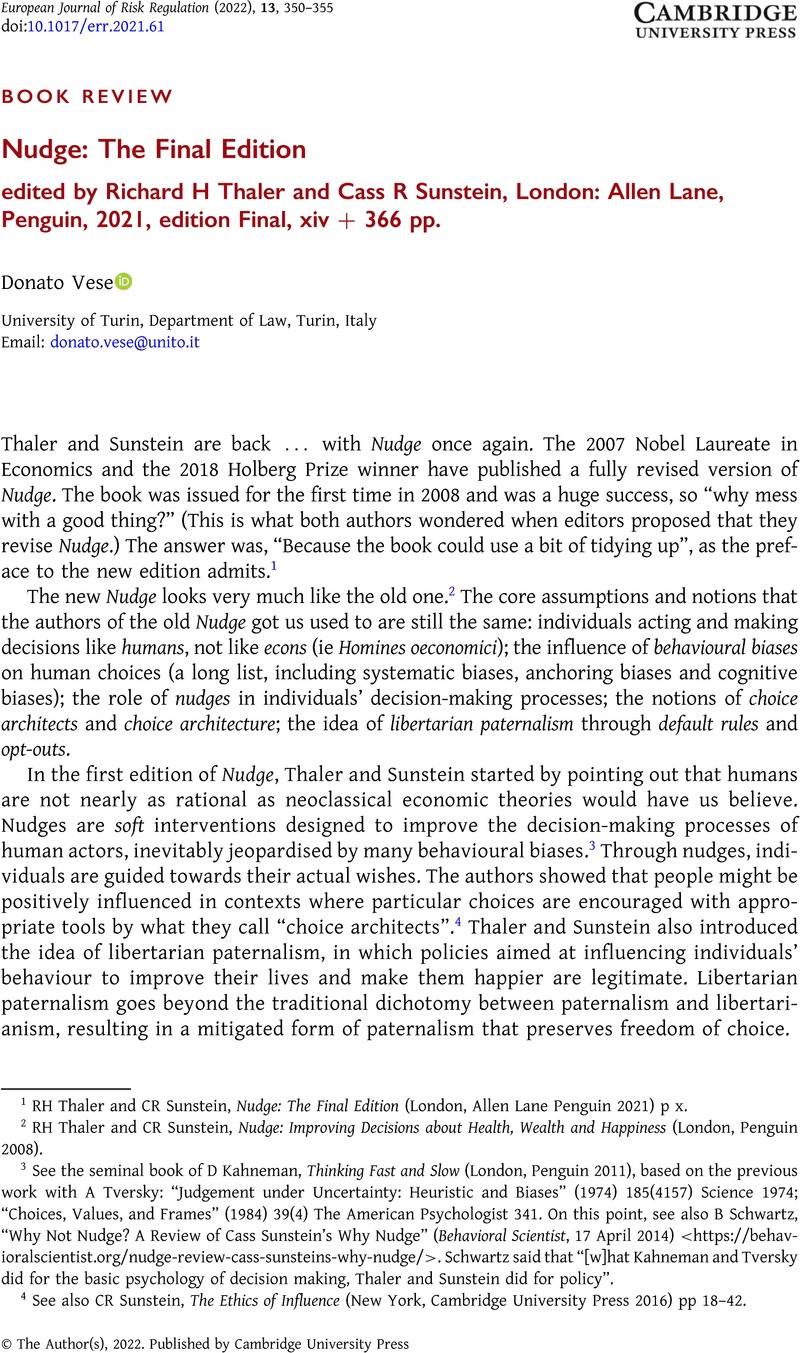Published online by Cambridge University Press: 13 January 2022

1 RH Thaler and CR Sunstein, Nudge: The Final Edition (London, Allen Lane Penguin 2021) p x.
2 RH Thaler and CR Sunstein, Nudge: Improving Decisions about Health, Wealth and Happiness (London, Penguin 2008).
3 See the seminal book of D Kahneman, Thinking Fast and Slow (London, Penguin 2011), based on the previous work with A Tversky: “Judgement under Uncertainty: Heuristic and Biases” (1974) 185(4157) Science 1974; “Choices, Values, and Frames” (1984) 39(4) The American Psychologist 341. On this point, see also B Schwartz, “Why Not Nudge? A Review of Cass Sunstein’s Why Nudge” (Behavioral Scientist, 17 April 2014) <https://behavioralscientist.org/nudge-review-cass-sunsteins-why-nudge/>. Schwartz said that “[w]hat Kahneman and Tversky did for the basic psychology of decision making, Thaler and Sunstein did for policy”.
4 See also CR Sunstein, The Ethics of Influence (New York, Cambridge University Press 2016) pp 18–42.
5 Thaler and Sunstein, supra, note 1, 152.
6 ibid, 155.
7 S Dynarski, CJ Libassi, K Michelmore and S Owen, “Closing the Gap: The Effect of a Targeted, Tuition-Free Promise on College Choices of High-Achieving, Low-Income Students” National Bureau of Economic Research Working Paper No. 25349 (December 2018, rev. June 2020), 1–75, DOI: 10.3386/w25349.
8 Thaler and Sunstein, supra, note 1, 169–70.
9 ibid, 281–308.
10 However, it should be noted that “[t]o qualify as a nudge, an intervention must not impose significant material incentives”. If so, subsides, taxes and fines or jail sentences are not nudges. In this regard, Sunstein, supra, note 4, 21.
11 For a comprehensive stance on the criticism of the first edition of Nudge, see also CR Sunstein, Why Nudge? The Politics of Libertarian Paternalism (New Haven, CT, Yale University Press 2014). On the legal implications of behavioural regulation in Europe, see A Alemanno and A-L Sibony (eds), Nudge and the Law: A European Perspective, with a foreword by Cass Sunstein (Oxford, Hart Publishing 2015).
12 Thaler and Sunstein, supra, note 1, 311–39.
13 See G Mitchell, “Libertarian Paternalism is an Oxymoron” FSU College of Law, Public Law Research Paper No. 136; FSU College of Law, Law and Economics Paper No. 05-02, 5 November 2004, 40 <https://ssrn.com/abstract=615562>. Mitchell argues that “[l]ibertarian paternalism, as currently formulated, is not designed to liberate individuals from their irrational tendencies but to capitalize on irrational tendencies to move citizens in directions that the paternalistic planner deems best”.
14 See EL Glaeser, “Paternalism and Psychology” (2006) 73(1) University of Chicago Law Review 133–56; see also G Loewenstein, C Bryce, D Hagmann and S Rajpal, “Warning: You Are About to Be Nudged” (2015) 1(1) Behavioral Science & Policy Association 35–42; H Bruns et al, “Can Nudges Be Transparent and Yet Effective?” (2018) 65 Journal of Economic Psychology 41–59.
15 See G Gigerenzer, “On the Supposed Evidence for Libertarian Paternalism” (2015) 6(3) Review of Philosophy and Psychology 361–83; R Hertwig and T Grüne-Yanoff, “Nudging and Boosting: Steering or Empowering Good Decisions” (2017) 12(6) Perspectives on Psychology Science 973–86.
16 Thaler and Sunstein, supra, note 1, 321.
17 See D Vese, “Governing the Fake News: The Regulation of Social Media and the Right to Freedom of Expression in the Era of Emergency” (2021) European Journal of Risk Regulation DOI: 10.1017/err.2021.48.